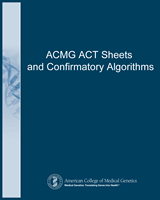NCBI Bookshelf. A service of the National Library of Medicine, National Institutes of Health.
The ACMG ACT Sheets and their accompanying algorithms are a great resources for health care providers looking for information on genetic conditions (identified through newborn screening and beyond) to help inform clinical decision making. Developed by the American College of Medical Genetics and Genomics and the National Coordinating Center for the Regional Genetics Networks (NCC), ACMG ACT Sheets are available on the ACMG websites. Given the rarity of many genetic conditions—ACT Sheets and algorithms are excellent refreshers on the conditions, diagnoses, and next steps for patients.
For each marker(s), there is 1) an ACTion (ACT) sheet that describes the short term actions a health professional should follow in communicating with the family and determining the appropriate steps in the follow-up of the infant that has screened positive, and 2) an algorithm that presents an overview of the basic steps involved in determining the final diagnosis in the infant.
The first page of the ACT sheets includes information developed by the ACT Sheet Workgroup. Each ACT Sheet also include links to informational resources to allow the health professional to obtain additional information, if needed. The second page of the ACT sheet includes links to web sites that allow one to identify sub-specialists for consultation and referral for the condition(s) described in the ACT Sheet.
Contents
- AuthorsLast Update: February 1, 2024.
- Newborn Screening ACT Sheets and AlgorithmsLast Update: July 2024.
- Carrier ACT Sheets and AlgorithmsLast Update: 2012.
- Diagnostic Test ACT SheetsLast Update: 2012.
- Family History ACT SheetsLast Update: 2012.
- Prenatal Cell-Free DNA Screening ACT SheetsLast Update: September 2023.
- Secondary Findings ACT SheetsLast Update: 2019.
- Transition ACT SheetsLast Update: 2012.
Disclaimer: The ACT sheets and algorithms are designed primarily as educational resources for physicians to help them provide quality medical services, and adherence to them does not necessarily ensure a successful medical outcome. The ACT sheets and algorithms should not be considered inclusive of all proper procedures and tests or exclusive of other procedures and tests that are reasonably directed to obtaining the same results. In determining the propriety of any specific procedure or test, the healthcare provider should apply his or her own professional judgment to the specific clinical circumstances presented by the individual patient or specimen. It may be prudent, however, to document in the patient's record the rationale for any significant deviation from these ACT sheets and algorithms.
The Site contains links to third party websites. These links are provided solely as a convenience to users and not as a guarantee, warrantee, or recommendation by ACMG of the content on such third-party websites or as an indication of any affiliation, sponsorship or endorsement of such third party websites. ACMG is not responsible for the content of linked third-party sites and does not make any representations regarding the privacy practices of, or the content or accuracy of materials on, such third-party websites. If you decide to access linked third-party websites, you do so at your own risk. Your use of third-party websites is subject to the terms of use for such sites.
- NLM CatalogRelated NLM Catalog Entries
- A practice guideline from the American College of Medical Genetics and Genomics and the National Society of Genetic Counselors: referral indications for cancer predisposition assessment.[Genet Med. 2015]A practice guideline from the American College of Medical Genetics and Genomics and the National Society of Genetic Counselors: referral indications for cancer predisposition assessment.Hampel H, Bennett RL, Buchanan A, Pearlman R, Wiesner GL, Guideline Development Group, American College of Medical Genetics and Genomics Professional Practice and Guidelines Committee and National Society of Genetic Counselors Practice Guidelines Committee. Genet Med. 2015 Jan; 17(1):70-87. Epub 2014 Nov 13.
- Beyond the black stump: rapid reviews of health research issues affecting regional, rural and remote Australia.[Med J Aust. 2020]Beyond the black stump: rapid reviews of health research issues affecting regional, rural and remote Australia.Osborne SR, Alston LV, Bolton KA, Whelan J, Reeve E, Wong Shee A, Browne J, Walker T, Versace VL, Allender S, et al. Med J Aust. 2020 Dec; 213 Suppl 11:S3-S32.e1.
- Folic acid supplementation and malaria susceptibility and severity among people taking antifolate antimalarial drugs in endemic areas.[Cochrane Database Syst Rev. 2022]Folic acid supplementation and malaria susceptibility and severity among people taking antifolate antimalarial drugs in endemic areas.Crider K, Williams J, Qi YP, Gutman J, Yeung L, Mai C, Finkelstain J, Mehta S, Pons-Duran C, Menéndez C, et al. Cochrane Database Syst Rev. 2022 Feb 1; 2(2022). Epub 2022 Feb 1.
- Review Evidence Brief: The Quality of Care Provided by Advanced Practice Nurses[ 2014]Review Evidence Brief: The Quality of Care Provided by Advanced Practice NursesMcCleery E, Christensen V, Peterson K, Humphrey L, Helfand M. 2014 Sep
- Standards and guidelines for the interpretation of sequence variants: a joint consensus recommendation of the American College of Medical Genetics and Genomics and the Association for Molecular Pathology.[Genet Med. 2015]Standards and guidelines for the interpretation of sequence variants: a joint consensus recommendation of the American College of Medical Genetics and Genomics and the Association for Molecular Pathology.Richards S, Aziz N, Bale S, Bick D, Das S, Gastier-Foster J, Grody WW, Hegde M, Lyon E, Spector E, et al. Genet Med. 2015 May; 17(5):405-24. Epub 2015 Mar 5.
- ACMG ACT Sheets and AlgorithmsACMG ACT Sheets and Algorithms
Your browsing activity is empty.
Activity recording is turned off.
See more...
